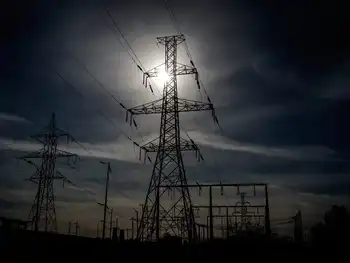Major holes found in renewable energy bill
By Knight Ridder Tribune
Arc Flash Training CSA Z462 - Electrical Safety Essentials
Our customized live online or in‑person group training can be delivered to your staff at your location.

- Live Online
- 6 hours Instructor-led
- Group Training Available
The legislation requires that 12.5 percent of the electricity sold by utilities such as Progress Energy and Duke Energy come from renewable sources and efficiency programs. The measure overwhelmingly passed in the state Senate, but it has bogged down in the House. As opposition increases, state lawmakers spent days scrambling to salvage the bill. Among the concerns:
- Alternative fuels could pollute more than coal-burning power plants.
- There could be an increase in hog waste lagoons, because the bill encourages utilities to buy electricity generated from methane gas in the lagoons.
- Electric utilities could skimp on efficiency programs and renewables and build large power plants instead.
None of these consequences are spelled out in the bill, but they have emerged as issues in recent weeks as lawmakers and activists parsed the proposal.
"Do we want to pursue an energy strategy that's dirtier than coal?" asked Rep. Pricey Harrison, a Guilford County Democrat who leads the committee. "This is incredibly complex, and I don't think any one of us understands all the implications of this bill."
Lobbyists, lawyers and legislative staff spent six months crafting the bill in the Senate.
It started as a renewables and efficiency proposal and grew into a comprehensive energy policy. Scores of participants attended the negotiations, but only five major environmental organizations did. The legislation that emerged from the talks included sweeteners for many interest groups. The environmentalists won concessions: They were able to raise the minimum requirement from renewables and efficiency from 10 percent to 12.5 percent. And utilities agreed to drop opposition to linking their power grids to industrial-scale solar power units. But some say the utilities won the biggest prize: a provision to pass some of the costs of new power plants to customers years before the plants are built.
The state's two Fortune 500 utilities are among the proposal's biggest backers. They say this provision will lower financing costs and save customers money. Opposition grew significantly this month as the bill started being reviewed by the House energy committee. A dozen environmental groups got involved for the first time, and they didn't like what they saw. Groups such as the Sierra Club that considered the bill flawed all along continued seeking an opening to make revisions. Still, several environmental groups that negotiated the bill stand by it. They say the benefits far outweigh the disadvantages, and that the bill's drawbacks are overblown.
The bill contains a new state tax credit for energy efficient homes and a renewable tax break for nonprofit groups, said Ivan Urlaub, executive director of N.C. Sustainable Energy Association. "We've got buy-in from every major stakeholder except for this number of environmental organizations," Urlaub said. "We see an insane amount of opportunity to rapidly move our utilities toward good climate-change solutions. This is just a first step to ean ourselves off our total dependence on coal and nuclear." Less than 2 percent of the state's electricity comes from renewables and efficiency programs.
The proposal would raise the minimum to 12.5 percent for Raleigh-based Progress and Charlotte-based Duke by 2021, and to 10 percent for municipal utilities and electric cooperatives by 2018. But many environmentalists are frustrated that the proposal includes no penalty for utilities that fail to meet the minimum requirements. At the same time, the bill caps how much utilities can spend on renewables and efficiency. About two dozen states h ve requirements for renewables and efficiency, and many include penalties, said Molly Diggins, North Carolina director for the Sierra Club. Possible changes Harrison said her committee will likely consider a proposal that could require utilities to go beyond the 12.5 percent minimum requirement before they are permitted to build new power plants.
Renewables also are getting scrutiny. An engineer from the state's Department of Environment and Natural Resources' Division of Air Quality told the energy committee that solar energy is too expensive for wide-scale deployment and wind powe too controversial in the mountains. The agency said that power plants fueled by wood waste generate more pollution than modern coal-burning power plants. As a result, the committee is likely to consider tightening emission standards for power plants fueled by wood and animal waste, a move that could raise the cost of those fuels considerably.
Despite the last-minute push by environmentalists, the utilities say the bill is sound. "We are confident that the consensus bill will withstand the scrutiny of the legislative process," said Progress Energy spokesman David McNeill. But Jim Warren, director of Durham-based N.C. Waste Awareness and Reduction Network, called it deeply flawed.
"We feel there's a hundred lawsuits in that bill," Warren said. "It needs to be overhauled or it needs to be killed."











